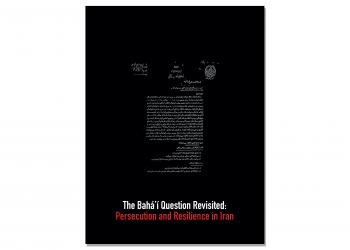New report examines relentless persecution of Iranian Baha’is
Iran’s persecution of Iranian Baha’is continues unabated, despite government promises to end religious discrimination and improve human rights, according to a new report from the Baha'i International Community.
Officially released today, “The Baha'i Question Revisited: Persecution and Resilience in Iran” says Iran has actually stepped up certain elements of its campaign against Baha’is, such as the dissemination of anti-Baha'i propaganda and a crackdown on Baha'i businesses.
The report offers a number of new statistics on the government’s oppression of Baha’is. Since 2005, it says, when the government of President Mahmoud Ahmadinejad began to re-intensify the persecution, there have been more than 860 arrests and some 275 Baha’is have been sent to prison.
During that time, at least 240 Baha’is have been expelled from university and thousands more have been blocked from enrolling through various ruses. There have been more than 950 specific, documented incidents of economic discrimination, such as shop closings or dismissals.
The report also says the situation has not changed under the administration of President Hassan Rouhani, who came to power in August 2013 with promises to end religious discrimination.
Since President Rouhani’s inauguration, the report says, Baha'is have faced no less than 388 documented incidents of economic persecution and at least 151 Baha’is have been arrested. The government’s campaign to incite hatred against Baha’is has also intensified under his presidency, with more than 20,000 pieces of hateful anti-Baha’i propaganda disseminated in the Iranian media.
“Taken altogether, what we have seen is an overall shift in tactics by the Iranian government, apparently as part of an attempt to conceal from the international community its ongoing efforts to destroy the Baha’i community as a viable entity,” said Bani Dugal, the principal representative of the Baha'i International Community to the United Nations.
“While arrests and imprisonments certainly continue, the government has relied increasingly on less blatant forms of persecution, such as economic, educational, and cultural discrimination.
“All this comes despite steadfast condemnation from the international community, activists, and, increasingly, ordinary citizens inside Iran,” said Ms. Dugal.
The 128-page report contains numerous human stories about the impact of the persecution on the lives of Baha’is in Iran, showing how they have responded with surprising reserves of resilience and, even, small initiatives aimed at the betterment of Iranian society as a whole.
The report also examines the history of the persecution, offering an explanation for why it continues in the face of international pressure. An extensive appendix reproduces numerous secret government documents that show unequivocally that such persecution is official policy.
“The take-away from the report,” said Ms. Dugal, “is that international pressure on Iran, whether by the United Nations, the news media, activists, or even the general public, remains a critical means of protection against a wider pogrom that targets the largest non-Muslim religious minority in Iran.”
For more information, go to www.bic.org/Bahai-Question-Revisited
